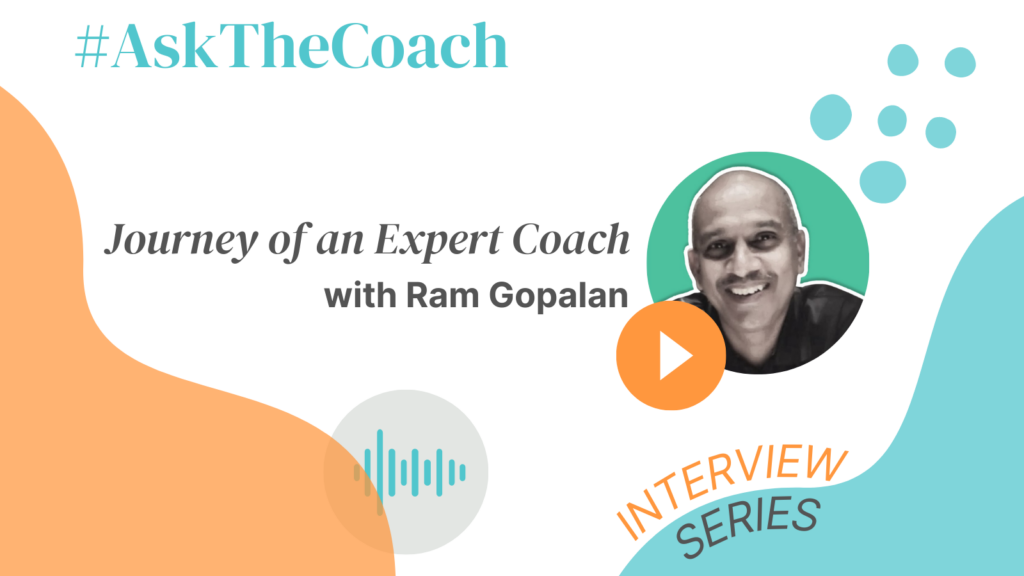This week as part of our Business of Coaching series we interviewed senior leadership & executive coach Ram Gopalan to find out about his journey, how he got started as a coach and his coaching methodology. Ram is someone who brings decades of first-hand senior executive experience having worked in various start-ups and MNCs and having served as the Country Manager and Vice President at Sapient Nitro.
He is also recognized as one of the most talented coaching leaders in India by CHRO Asia. But it didn’t always start like that! Scroll down for excerpts from the interview.
Ipsita: So, when I was reading your intro, right, I noticed that you’ve had all this experience of having worked in various start-ups and as the Vice President & Country Manager of Sapient Nitro. So, you’ve had this extensive & successful corporate experience for so many years. What made you go towards coaching? What inspired you to move to a different field altogether?
Ram: I was traveling too much and I was away from home. So, I wanted to find a way to be at home, be with my family, be with my daughter. And that’s what made me quit my full-time job, thinking at that point in time I would do some freelancing work, some consulting work.
And a couple of months into freelancing, somebody mentioned to me ‘Why don’t you try a coach certification? Why don’t you become a coach?’ This was a very off-chance meeting – I just bumped into somebody and that’s what started my coaching journey.
And somehow what that person suggested seemed to resonate with me. And once I did the certification, I loved what coaching was capable of doing. And therefore, ten years later, here is where I am!
Ipsita: And when you started the journey, did it resonate with you then? Once you started, did it feel like it was the right thing for you to move into coaching?
Ram: Once I started, it was almost two parallel tracks. At one point, I was doing both my consulting work as a marketing strategy consultant and technology work, as well as being a coach. And at the end of the day, when I would reflect on it, I felt that what I did as part of the coaching journey was far more fulfilling than what I did as a consultant.
And when I deeply thought about it, what came to me was that coaching was always about the person in front of me.
So right from the word go, coaching possibly did appeal to me far more than consulting.
Ipsita: That’s amazing. And how did you get started? What were some of the first things that you did to get started as a coach
Ram: Yeah. So, I would say newly certified, you’ve got all the skills – you’ve learnt how to ask questions, how to listen to a client, etc. And practice makes perfect. So, I spent a lot of time trying to find people that I could practice with. So, there were all the peer coaches – people who had gotten certified along with me.
They were the first people that I could test my coaching methodology or skills on. Then I reached out to a bunch of people who had worked with me at Sapient and people who had moved on from Sapient to other organizations – people who were in leadership roles out there.
And when I started, I would sell myself as a coach, saying, ‘Hey, I’m available, I’m independent.’ And the first appeal was, ‘Look, I’m a new coach, so I will make mistakes as a coach, but I won’t mess it up so much that the person will quit your company and go.
So, you can give me the assignment. [laughs] So a lot of it was that people that knew me, people that trusted me. And that’s how I started.”
Ipsita: Wonderful. Do you have a favourite coaching moment? Something that stands out?
Ram: Yeah. So, this would be in my second or third engagement, when I was contracted to do 12 sessions over a period of six months, and I had completed six sessions with this client. He was a senior director at an IT consulting firm where one of my ex-colleagues from Sapient was the Vice President.
So, he had requested me to coach the senior director. So, after six sessions, I went and checked in with the sponsor and said, ‘Hey, how is the client doing?’ Until that point in time, I thought the engagement was going great. Because it was, according to me.
The client was showing up for all the sessions and he was very ecstatic about the changes that he was making and very, very grateful for all the coaching. So, when I went in for the review with the sponsor, it was almost like I was expecting to hear a lot of great stuff about me as the coach and whatnot. And [it turns out] it was brutal.
It was exactly the opposite! And that was a big moment for me because I realized that there is a blind spot for both the coach as well as the person being coached and therefore including stakeholders is vital in the coaching conversation during the coaching journey.
Getting intermittent feedback is a very beautiful thing for me as a coach and as well as for the participant, because it helps us to get insights. Big defining moment for me.
Ipsita: Wow! But would you would you say that was your favourite moment?
Ram: Yes! Because it made me look for coaching that is measurable. It made me look for coaching methodologies where I could include stakeholders and demonstrate impact. That’s what led me to Dr Marshall Goldsman’s Stakeholder Centred Coaching. And after that, I have pretty much been doing all my assignments with Marshall’s methodology.
Though it was brutal, I would say definitely my most favourite moment.
Ipsita: Great stuff. And you mentioned Marshall Goldsmith Stakeholder Centred Coaching, right? So, can you walk us through what makes that different from other models of coaching?
Ram: Coaching has always been characterized by a one-on-one conversation, and it could be in a room or it could be on a Zoom call like this one. But it’s always been between the coach and the person being coached. Whereas in the stakeholder centred coaching, coaching is out in the open.
Which means that the leader is actually asking for feedback and suggestions from his or her stakeholders and making them part of the coaching journey itself.
So, it’s coaching in the open. It is coaching with a lot of transparency, humility and courage on the part of the leader. It takes a lot of vulnerability on the part of the leader to say ‘I am working to get better at something, and I need your help to get better at that.’
So, involving stakeholders, I have found it to be far more superior and far more measurable and impactful for both the leader and for the organisation!
Ipsita: Since we’re nearing the end of our conversation here today and I’m hoping a lot of new coaches will be listening to this to gain insights from a coach such as yourself, do you have any words of wisdom for new & upcoming coaches?
Ram: I don’t know about words of wisdom but a couple of things. Don’t make the coaching journey about yourself – it’s not about you who’s trying making a career here, you’re trying to help others be successful. That would be the first advice.
The other thing would be practice makes perfect. If you’re just starting with your journey, anything between 3-5 years is what it would take for you to see a difference. Work with a bunch of people for you to be assured of yourself as a coach and feel good about yourself. So, give it time and don’t try to hurry things up!
Ipsita: Thank you so much Ram for your time and your insights!
Ram: Thank you.
About Simply.Coach
Simply.Coach is an enterprise-grade coaching software designed to be used by individual coaches and coaching businesses. Trusted by ICF-accredited and EMCC-credentialed coaches worldwide, Simply.Coach is on a mission to elevate the experience and process of coaching with technology-led tools and solutions.

Content Marketing Manager @Simply.Coach
Ipsita Nayak is a full-time writer-editor-content strategist and a part-time NLP coach & yoga teacher. She believes conventions are overrated, has a disproportionate need for solo time over social time, and loves a good mix of sci-fi and trashy TV in her free time!









